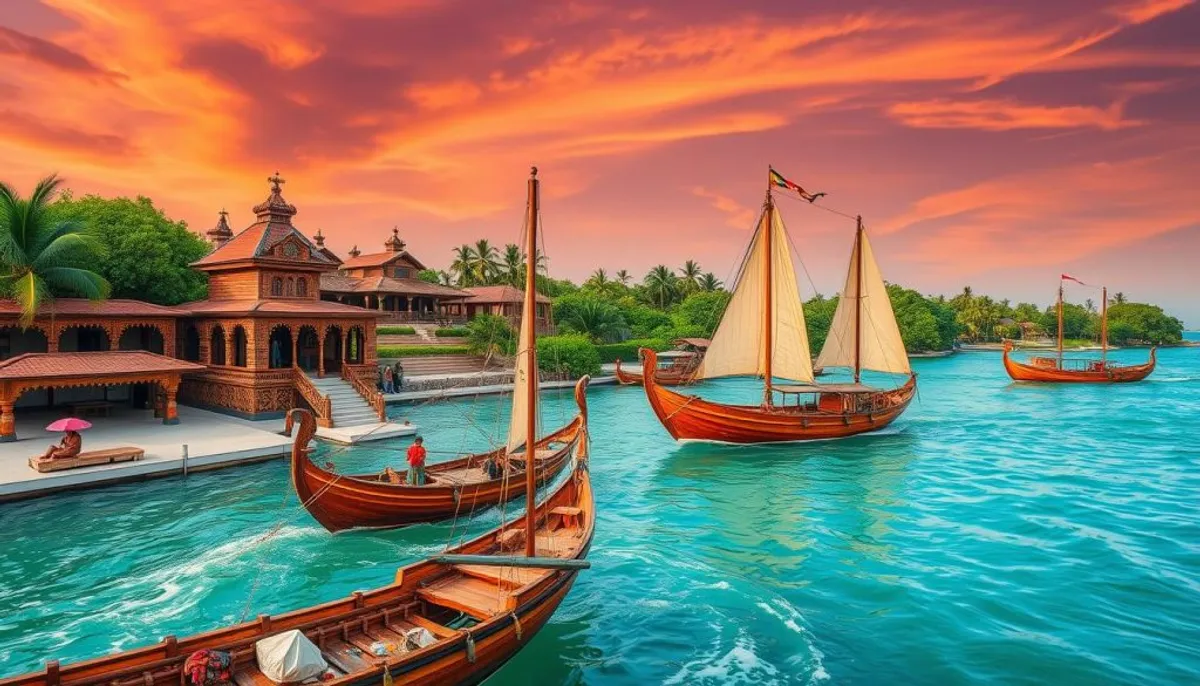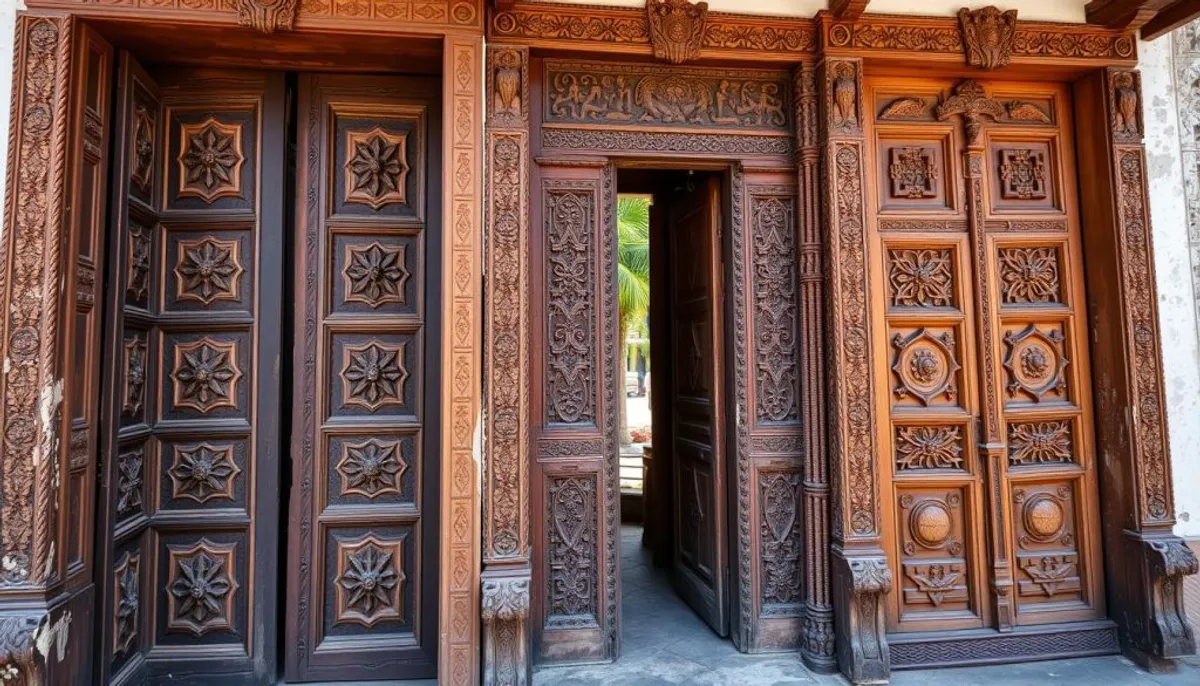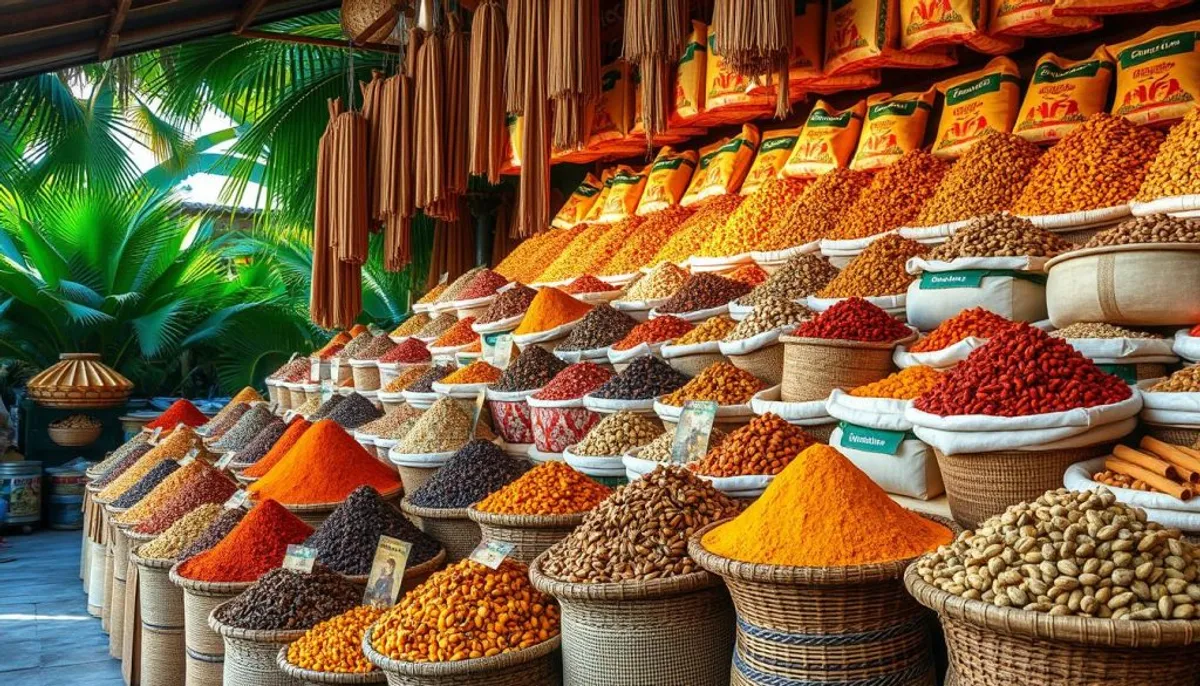Zanzibar, a treasure of the Indian Ocean, is a true cultural heritage. This island, full of mystery, showcases a profound Zanzibari identity. It is shaped by centuries-old traditions and multicultural influences. Stone Town, its historical heart, is a living testament to this unique heritage.
The Zanzibar archipelago shines with its cultural diversity. Its white sandy beaches are alongside a tumultuous history. Arab, African, Indian, and European influences blend together. This fusion has created a vibrant culture, visible in the architecture, cuisine, and local customs.

Stone Town, listed as a UNESCO World Heritage Site, captivates visitors with its maze of alleys. Its carved doors, Omani palaces, and colonial buildings tell the fascinating story of Zanzibar. The bustling markets, like Darajani, offer an immersion into the island's daily life.
Zanzibari gastronomy reflects this cultural mix. Spicy flavors blend with African, Arab, and Indian influences, creating a unique cuisine. This culinary richness is a testament to the island's cosmopolitan past and its central role in the spice trade.
The historical essence of Stone Town: a unique multicultural crossroads
Stone Town, a treasure of Zanzibar, illustrates an unparalleled UNESCO heritage. This city, full of mystery, reflects a rich and diverse past. Its network of narrow alleys and historic buildings tells a fascinating story.
The Arab, Indian, and African influences
Stone Town is animated by a unique cultural blend. Its architecture, a marriage of Arab, Indian, and African elements, is impressive. The ornate facades and carved wooden balconies evoke a cosmopolitan past.
The legacy of maritime trade
The trade routes have shaped the identity of Stone Town. The port, once essential on the spice route, attracted merchants and explorers from around the world. This thriving activity has left its mark in the bustling markets and the vibrant atmosphere of the city.
The period of the Sultanate of Oman
The Sultanate of Oman profoundly marked Stone Town. Its influence is reflected in the majestic palaces and elegant mosques. This era contributed to forging the unique identity of the city, blending Omani traditions and local Swahili culture.
| Period | Major Influence | Visible Heritage |
|---|---|---|
| Pre-colonial | Swahili | Traditional architecture |
| Sultanate of Oman | Arab | Palaces and mosques |
| Colonial | European | Administrative buildings |
Zanzibari culture through its iconic architecture
Zanzibari architecture is a captivating blend of cultural influences. Stone Town, listed as a UNESCO World Heritage Site, illustrates this rich heritage. This historical heart of Zanzibar showcases a distinct urban landscape shaped by centuries of trade and cultural exchanges.
The famous carved doors of Stone Town
The carved doors embody the essence of Zanzibari architecture. They tell the story of their owners, revealing their social status and origins. Each door is a unique masterpiece, adorned with intricate patterns and significant symbols.

The historical palaces and iconic buildings
Stone Town is home to historical palaces that testify to its glorious past. The Sultan's Palace and the House of Wonders illustrate Omani and British influence. These majestic buildings offer a fascinating glimpse into Zanzibar's history and its importance in maritime trade.
The art of Swahili construction
The Swahili style defines Zanzibari architecture. It is characterized by its narrow balconies, terrace roofs, and ornate facades. This architectural approach perfectly adapts to the island's tropical climate while recalling its defensive past. The art of Swahili construction continues to influence the urban aesthetic of Zanzibar, preserving its unique charm.
Living traditions and cultural practices
The Zanzibari customs embody a rich mix of influences. The island is the stage for a diversity of traditions that span the ages. The taarab music, a symbol of Zanzibar, combines Arab and African influences, offering a unique atmosphere during festivities.
Traditional festivals enliven island life. The Mwaka Kogwa, Swahili New Year celebration, brings communities together in a festive atmosphere. These events perpetuate ancestral values and strengthen social ties while celebrating street art that beautifies the city's streets.
Local craftsmanship plays a central role in Zanzibari culture. Artisans preserve ancestral techniques, such as wood carving and textile work. These skills enrich the island's cultural identity and captivate visitors.
| Cultural Aspect | Characteristics | Importance |
|---|---|---|
| Taarab | Music blending Arab and African influences | Cultural emblem of Zanzibar |
| Mwaka Kogwa | Celebration of the Swahili New Year | Strengthening community ties |
| Craftsmanship | Wood carving, textile work | Preservation of ancestral techniques |
The peaceful coexistence of Muslim, Hindu, and Christian religious practices illustrates the cultural diversity of Zanzibar. This interfaith harmony enriches the island's intangible heritage and shapes its unique identity.
The Zanzibari culinary heritage
The Zanzibari cuisine is a true gastronomic treasure. It combines Indian, African, and Arab flavors, creating an unparalleled culinary fusion. The island, known as the "spice island," offers a memorable tasting experience to all its visitors.
The island's iconic spices
Zanzibar is renowned for its spices. Cloves, cinnamon, and turmeric flavor local dishes. The Darajani market in Stone Town is a true paradise for spice lovers. Exotic fruits such as papaya and passion fruit can also be found there.

The fusion of Indian and African flavors
The Zanzibari cuisine is the result of a skillful fusion of culinary traditions. Zanzibar Pilau and Nyama Choma are iconic dishes. Fresh seafood and coconut rice enrich this feast of flavors. Restaurants like The Rock offer refined cuisine, while the beaches of Kendwa are ideal for casual barbecues.
The markets and local street food
Street food plays a central role in Zanzibari culinary culture. Night markets offer a variety of local dishes. Zanzibari pizza, samosas, and sugarcane juice are must-tries. For an authentic experience, a local guide like Salim can direct you to the best spots, away from tourist traps. The beach culture of Zanzibar also adds a unique dimension to this culinary experience, offering flavors inspired by the sea.
| Dish | Origin | Main Ingredients |
|---|---|---|
| Zanzibar Pilau | Indo-Arab fusion | Rice, spices, meat |
| Nyama Choma | African | Grilled meat, spices |
| Zanzibari pizza | Local fusion | Thin dough, eggs, minced meat |
Traditional arts and crafts
Zanzibari craftsmanship reflects the very essence of the island. It reflects its rich history and cultural diversity. Local artisans use ancestral techniques to create unique works. These creations tell the story of Zanzibar.
Fabrics and textile work
The traditional fabrics of Zanzibar are known for their colorful patterns and elaborate designs. The kanga and kitenge, two iconic fabrics, are everywhere in daily life. These vibrant textiles are used to make clothing, accessories, and decorations.
Wood carving
Wood carving is a major art form in Zanzibar. The carved doors of Stone Town are masterpieces. Local artisans create statues, masks, and decorative objects. They draw inspiration from Swahili, Arab, and Indian motifs.
Traditional jewelry
The local jewelry of Zanzibar combines Arab and African influences. Artisans work with silver and local gemstones to create unique pieces. Handmade Swahili bead necklaces are highly valued.
| Type of Craft | Materials Used | Cultural Influences |
|---|---|---|
| Traditional Fabrics | Cotton, natural dyes | Swahili, Arab, Indian |
| Wood Carving | Ebony, teak, mahogany | Swahili, Arab, Indian |
| Jewelry | Silver, local gemstones | Arab, African |
Zanzibari craftsmanship, rich and varied, offers a captivating glimpse into local culture. These unique creations allow visitors to take a piece of Zanzibar's magic home with them. They support the island's artisanal traditions.
Festivals and cultural celebrations
Zanzibar is animated by its Zanzibari festivals, offering a palette of traditions and entertainment. The Sauti za Busara, African music festival, transforms Stone Town in February. It brings together artists and music lovers from all over Africa, creating an unforgettable festive atmosphere.
The Mwaka Kogwa, celebration of the Swahili New Year, is a key moment in the cultural calendar. This traditional festival includes ancestral rituals, dances, and feasts. It symbolizes renewal and social cohesion, captivating locals and visitors alike.
Religious celebrations are essential in the island's cultural life. Eid al-Fitr, marking the end of Ramadan, is celebrated with fervor. The streets come alive with collective prayers, shared meals, and exchanges of greetings.
The Zanzibar International Film Festival (ZIFF) highlights local and international cinema. This major cultural event attracts filmmakers and film enthusiasts, while promoting cultural marketing. Films are screened on outdoor screens in the enchanting setting of Stone Town.
- Sauti za Busara: Music festival in February
- Mwaka Kogwa: Swahili New Year with traditional rituals
- ZIFF: International film festival
- Eid al-Fitr: Muslim celebration
These Zanzibari festivals reflect the cultural diversity of the island. They offer visitors a complete immersion into local traditions. They reinforce Zanzibar's unique identity.
Conclusion: Preserving a unique heritage
Zanzibari culture, listed as a World Heritage Site since 2000, is a fragile treasure in the face of growing tourism. Stone Town, with its 150 years of history, embodies the unique fusion of Arab, African, and Indian influences. The current challenge is to maintain the authenticity of this architectural gem while promoting sustainable tourism.
Promising initiatives are emerging to preserve the Zanzibari heritage. The creation of marine protected areas and the development of eco-lodges testify to a commitment to cultural conservation. Community tourism programs allow locals to get involved in preserving their heritage while benefiting from economic returns.
The cultural future of Zanzibar rests on a delicate balance. Educating younger generations about their rich history and supporting local artisans is essential. By adopting responsible practices and raising awareness among travelers, Zanzibar can hope to preserve its unique identity while opening up to the world.
RelatedRelated articles


